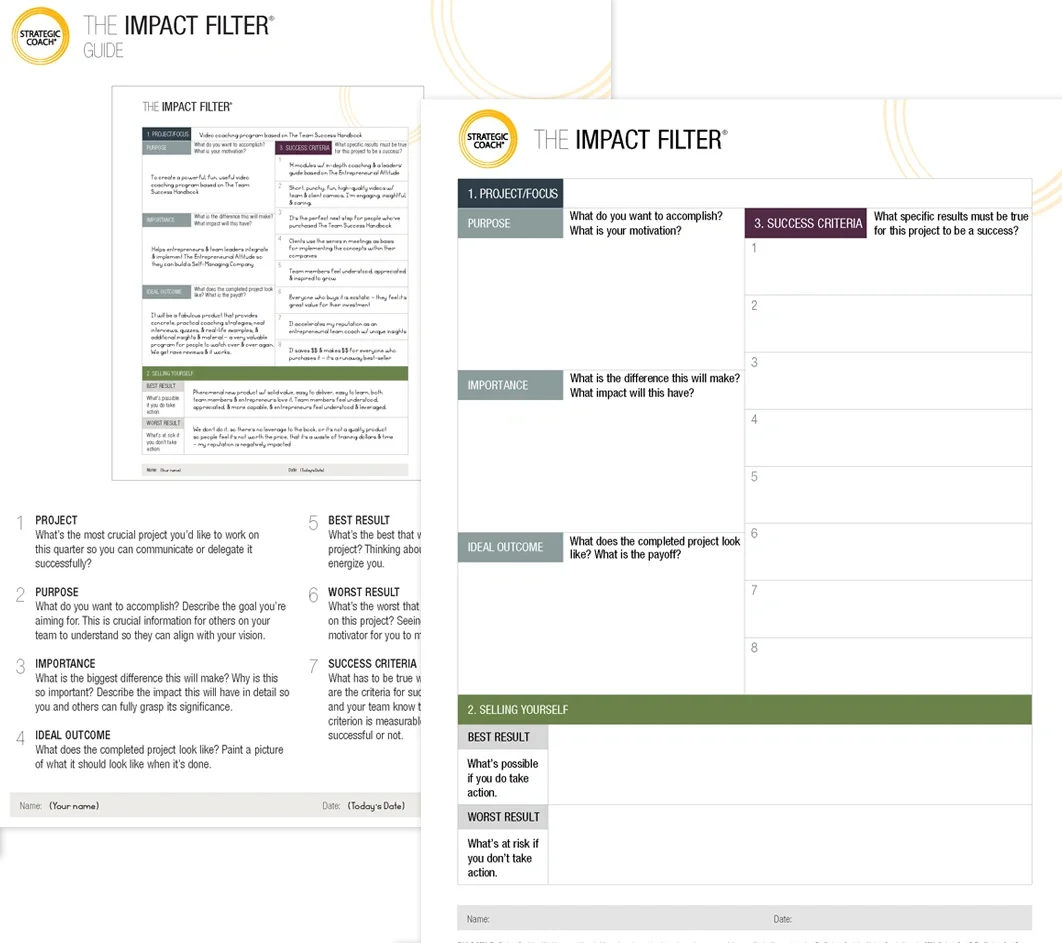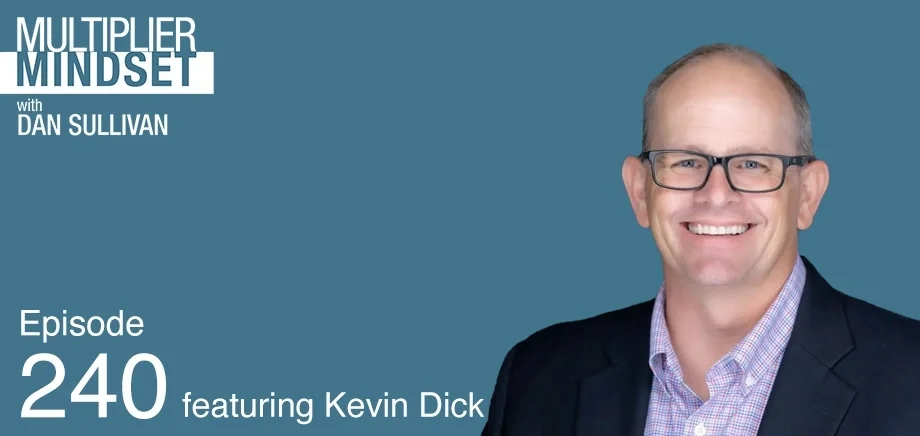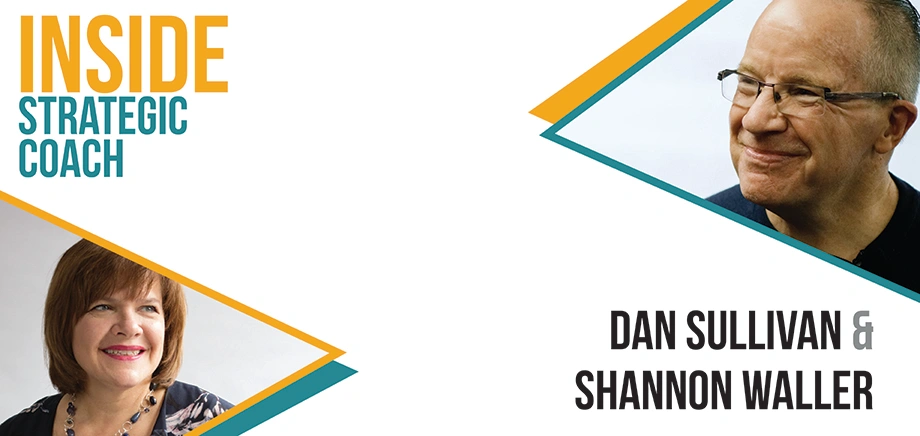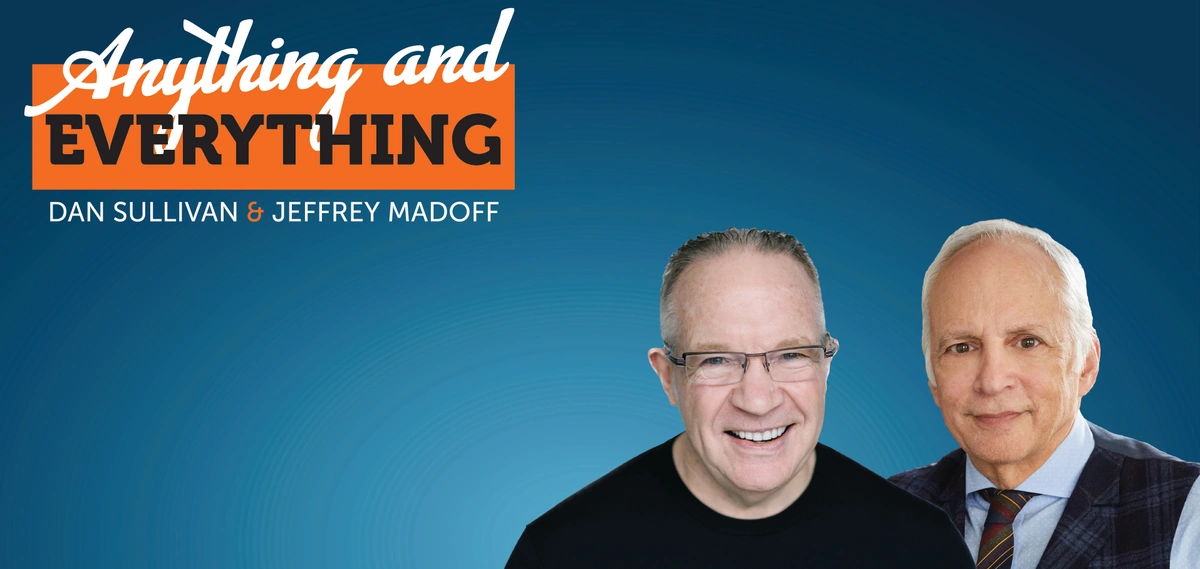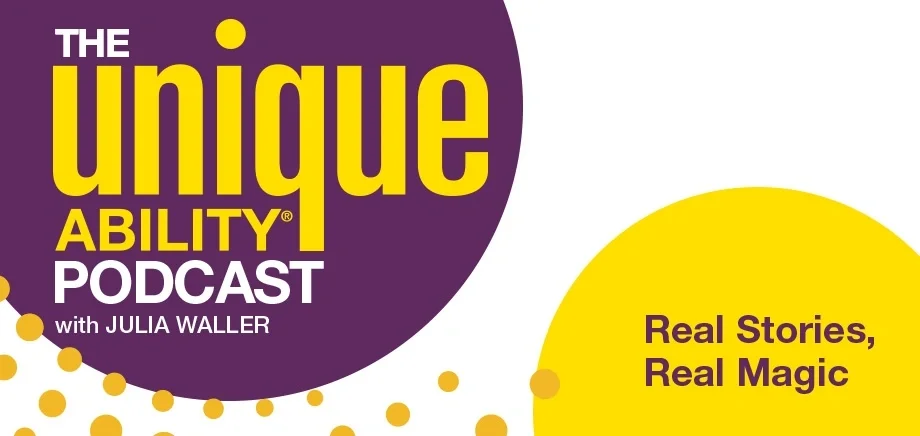Break The Mold And Build Something Better, with Kevin Dick
October 22, 2025
Hosted By
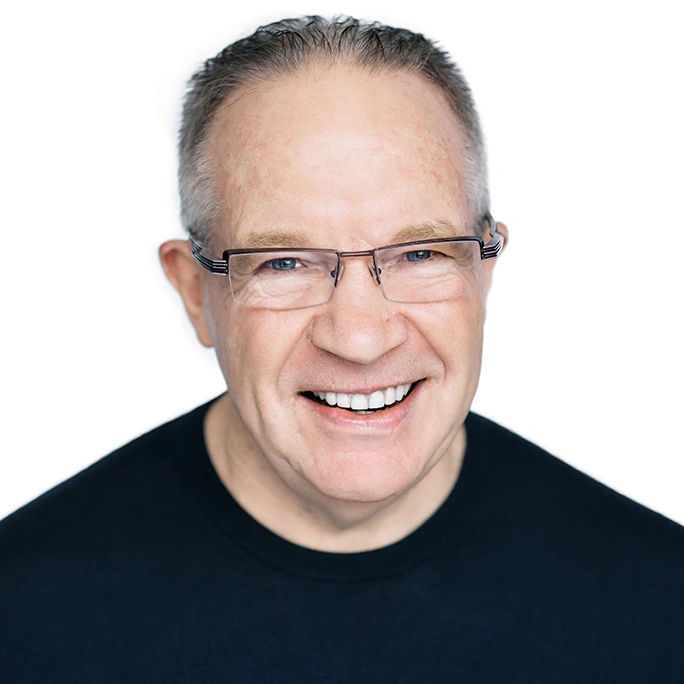 Dan Sullivan
Dan Sullivan
Are you ready to break through your next ceiling? In this episode, Dan Sullivan and Kevin Dick reveal how boosting your energy, surrounding yourself with growth-minded people, and structuring your time unlocks new levels of success. Learn how resilience, community, and self-belief help entrepreneurs thrive—especially when the market gets tough.
Here’s some of what you’ll learn in this episode:
- How The Strategic Coach® Program guides entrepreneurs to their next level of success.
- Why entrepreneurism is really an energy game.
- How your response to crisis changes once you’ve overcome one before.
- The unexpected benefits of being a Strategic Coach® member.
- How Kevin’s entrepreneurial drive started early in life.
Show Notes:
Entrepreneurs hit ceilings when their environment isn’t pushing them toward bigger goals.
Raising your goals demands greater capability from your team, not just yourself.
Breakthroughs are most likely during market crises, if you structure your time and attention to seize new opportunities.
Independence only works if you build a truly great company around yourself.
Entrepreneurial energy and resilience are shaped by who you surround yourself with every day.
Being around ambitious, positive people makes growth contagious.
You can reinvent yourself in times of adversity if you stay proactive and open to change.
The first year at Strategic Coach is about personal growth; after that, it’s about scaling your business practice.
Introspection is an entrepreneur’s secret weapon for overcoming major challenges and bouncing back from setbacks.
Your brain is wired to pursue what you focus on—feed it bigger goals, not limitations.
Self-belief matters more than anything, and it’s a daily discipline, not something that happens by luck.
Building a community with your clients creates trust, accountability, and lasting business success.
Even setbacks, mistakes, and crisis moments are raw material for entrepreneurial growth and transformation.
Resources:
Who Not How by Dan Sullivan with Dr. Benjamin Hardy
The Gap And The Gain by Dan Sullivan with Dr. Benjamin Hardy
Episode Transcript
Dan Sullivan: Hi. This is Dan Sullivan. I'd like to welcome you to the Multiplier Mindset podcast. We have a really great episode for Multiplier Mindset today. And this Kevin Dick and Kevin lives in Scottsdale, Arizona, wonderful place. Babs and I spend probably five weeks a year in Scottsdale. Marvelous place. He gave a lot of great entrepreneurial wisdom in his interview, but the one thing he talks about is his experience of coming to Strategic Coach was really about that a lot of entrepreneurs come to Strategic Coach because they want to know what's next.
They're ambitious entrepreneurs, you know, they're talented, they're successful entrepreneurs, but they've hit a wall or they've hit a ceiling, and where they are in the industry they're in, and the people that they're hanging around with aren't giving them any guidance. They're not giving them any clarity about what's the next level of success, beyond where they are. You know, if I look back 50 years, when I first started, 1974 I started coaching entrepreneurs. I found that back then, that was true. In the middle over 25 years ago, that's true, and today, it's true. You've hit a ceiling, you're ambitious, you want more, but you don't know what the more is.
And through the thinking that you do, the tools of Strategic Coach, the conversations in Strategic Coach, you get a breakthrough, and you jump to the next level, okay? And that requires a lot more energy than you have right now. And one of the things that I really liked about what Kevin talked about here was that you have to surround yourself with people who have a lot more energy than the people you're hanging around with, because it takes a lot of energy to shift gears. It takes a lot of energy to shift your focus. Takes a lot of energy to focus on much higher goals, which require much greater capability of the people around you.
And so it's a real energy game, you know, entrepreneurism. And you got to be very fit. You got to keep yourself in great shape. You got to eat properly, sleep properly, exercise properly. But the big thing is, you have to be energized by your future. You have to have a sense of what's coming, that you'd be willing to go through change right now, committing yourself to all sorts of new capabilities that you don't have right now. And I really, really love the story he tells of, you know, starting in more or less, he was a captive advisor big corporation, and he was a captive advisor, and it took energy to say, I got to go independent. He goes independent.
And then it takes energy to actually build a structure around your independence. You're not going to be independent for long if you don't build a really great company around you. And he did that. And I think the other thing that I really liked about his story—I've been through about seven since I started. So this goes back to the 1970s. I've been through seven upsets in the marketplace, one thing or another. You know, stock market crash, the mortgage disaster that happened in 2008, 2009, 2009, COVID was real disaster. And the interesting thing is that those are the times that entrepreneurs really make great breakthroughs. It's really interesting.
These are crises situations, and it's in the crisis that the new opportunities appear, but you got to have your time structured correctly. You have to have your attention structured properly to take advantage of the opportunities. Babs and I, when we have a situation like that, there's two things that my mind immediately switches. I remember in March of 2020 when it was real clear that COVID was going to be a real hit to the entrepreneurial world. And I said, we got to keep everybody's confidence up. So every day our job, Dan and Babs, all the team leaders and that, got to keep everybody's confidence up. But the other thing is, we've got to come out of this situation with a stronger team than we went in with, and so you don't welcome crises.
I mean, you can say all you want about the past. It doesn't mean that you're going to like it in the future. But when you do that, and you've been through it two or three times, and you know that it's happened, you immediately switch gears and you say, okay, now it's a different game, but we're going to come out incredibly better than we went in with. So I really love the story he tells. I mean, I picked three things that Kevin talked about. I could have picked three or four different ones, but these were really, really great lessons, and I just want to thank him for sharing his great entrepreneurial experience with everybody else.
Kevin Dick: My name is Kevin Dick. What I do for a living? I do a number of things. We own some rental properties, both corporate and domestic. I'm the founder of a wealth management firm. We actually have gone through a strategic sale, and I'm now the CEO and part owner and looking to do other things in the near future. Carrie and I, my wife and I were talking about this. My wife's been in Strategic Coach now about 11 years. I started in Santa Monica, I want to say 18 years ago, and then I went to Dan's class in Toronto for three years. And then I went back to Santa Monica with Chad a few years back, and had been in Coach that entire time. I took one basically, I call it a semester off. I took like, six months off, and that was a mistake.
So, yeah, I learned my lesson, and have been every quarter since I came out of the womb, an entrepreneur raised by a single mom. You know, we started off in kind of a tough neighborhood in Phoenix, and I would literally go door to door and ask people if they had returnable bottles. I thought that I was doing them a favor, and I didn't realize I was begging, you know, or selling, depending on how you look at it. Over time, I started my own landscaping company. We kept moving east across the valley, and for those folks that are in the valley, understand that that means you're moving more and more towards Scottsdale.
And by the time we got to Scottsdale, we moved into a neighborhood called McCormick Ranch, and I started a landscaping business when I was almost 15, and by the time I went off to college, I sold that landscaping business. Actually sold my route. I had 14 homes all in one little neighborhood, and I was actually able to sell the route. That's when I got started. You know, I always had money. And my friends never had money. You know, whether I was in a difficult situation or a soaring situation, my buddies were always like, how do you have money? I said, work. You know, it's yeah.
So I started in the industry with what we would call a wire house. And so I started in the business of securities with one of the big firms. And we were entrepreneurial in spirit, but there were some boundaries, you know, to what we could do and how we could do it, and those were frustrating to me. And actually, when I went to Coach, I went to Coach with an idea of trying to figure out what I was going to do next, and I was going to leave this industry because I was so disgusted, number one, with what I was seeing, with the way people were being treated, and how we were told to move product, you know, our investments. And I was frustrated and fed up.
I went to Coach, and through Coach, I met a gentleman. I'm sure everybody that's been in Coach for a while knows John Bowen. And John Bowen told me, Kev, don't screw this up. He's like, just change, you know, just change it. It was great advice. And I think the other thing that Coach really did for me early on, I found out about a get together here in Scottsdale. I met Joe Polish there. He had brought like, 18 people to meet Dan and Babs. Just being around all those entrepreneurs, it was infectious. And I could just feel energy, and I was around my people, and I could tell that, you know, just being in this environment was going to be good for me.
And I signed up, and at the time, that was a big spend for me, because it was not just, you know, not just Coach, but there's travel involved, there's costs around that. There wasn't a virtual program. Then, you know, I just, I went all in with this idea that I was going to reinvent myself. And what ended up happening was I reinvented the way we do business, and I went independent back in ‘05, yeah, it was the one of the biggest changes I could have made. So I started late ‘05 by ‘08. We had our own firm, and we had all of our stuff dialed in. As far as the way we were doing business, we were doing a service model versus a performance model, and it's taken off since then. We have three offices now, three locations. We manage a significant amount of assets.
I really am on the business now. It really is self-managing. I'm down to just a very few select clients, and my team manages all the rest well. ‘08 was horrible in our industry. 2008 was a nightmare. I mean, we all had our own version of that nightmare. ’08, ’09, we actually added probably the most clients we had ever added. Yeah, and it was, quite candidly, because of Coach and some of Dan's teachings about what to do when you're in crisis, you know, kind of reinvent yourself along the way. We went right to being very proactive, very touch-driven to our clients, and we started doing basically local seminars about what to do when, you know things are ugly, and we started attracting a lot of business.
So we got through that with joy, not without effort, and not without fear. But it actually turned out to be something very powerful, another event that happened through Coach. You know, this is kind of my strong claim to why this system works. My wife and I had started taking care of my dad. We'd moved him closer to us. He didn't have a lot of money, so we were kind of carrying him a little bit and getting him through sometimes. And in this process, he got very sick and he passed. And I hadn't been to Coach. That was my semester off. I was almost ashamed to come back to Coach, because what I felt like is I hadn't accomplished anything through that period. I was so caught up and trying to get things done, and it was a very emotional time as a very stressful time.
And when I came back to Coach six months later, and I pulled out my Coach materials from before this event happened, everything that had been something I wanted to accomplish had been done, and had been done quietly and seamlessly because we had made it a focus. We were still going through all the things we needed to get done in the crisis, but quietly and with my team, all the other work still got done because of the craft that we have created through Coach. So that's my claim, and I still say that, you know, the first year of Coach is about working on you, and then subsequent years is working on your practice. You know, whether it's designed that way or not, I find that you get real introspective in the beginning, and then that introspection helps you be more resilient when you're trying to carry big lifts and big projects.
You know, it's like what Dan always says, your brain is going to look for what you want, and so if you fill it with what you want and not with what you don't want, you're going to get there even though you're going through the minutia of whatever life is bringing. I don't know why it is, and you won't find this in the Coach community, but outside in the real world, people don't necessarily want to support you or your ideas or your success, and there's going to be a lot of people that poke things at your project or your plan, and they're going to try and, you know, bring you to reality, to their reality.
And you've got to be dedicated to your purpose. You've got to be dedicated and believe in yourself. And just keep pushing, you know, and keep learning. The whole Who Not How, you know, has been a game changer for us, you know, learning to lean on your confidants and the other people who believe in you, which, again, is, I think, something that you find in the Coach community, those relationships that you build, and the people that say, yeah, that is a crazy idea. I can't wait to see you do it. Instead of, that's a crazy idea. Are you crazy? WHY would you spend your money doing that? Or why would you invest in that?
You know, it's a group of folks that all come alongside and say, hey, you know, can we help? You know, is there something that you need accountability for? You know, Maryland people's always so good at that and following up and saying, hey, I know you wanted me to check in, how's it going, and kind of keep you on focus. But I think the number one thing is, you got to believe in yourself more than anybody else believes in you, and that's not always easy.
First of all, I surround myself with people who believe in what we're doing. So my team is very well vetted. They've been Kolbe, they've been, you know, Genius tested. They've been Printed, you know, all these different ways that we can really understand who our team is. We all share that. It's very open, so that we all know who we're working with, and those folks all support each other. But quite candidly, I mean, one of the best tools is something I learned very early on in Coach, which is number one, measure backwards, look at what you've already achieved, and then don't let it be a secret to yourself.
You know, I have a whole pad of all of the things that somebody said we couldn't do or it wasn't the best idea. You know, we've already tried that, and all the things that we have accomplished to date. And when somebody doubts me, I should say more when I start to doubt myself, I just measure back and I say, well, we've already done this, and we've already done this. Of course we can do this. And then every great note that anybody's ever written me, every accolade, every client letter, everything from, you know, somebody else that I've helped get out of something that they're going through, I keep those all in a box. I've saved every letter, every note, and if you really feel down, I just start flipping through them.
And it's also encouraged me to write those notes, you know, thank the people. Be gracious for the folks that have given you time or spend energy on you. Be infinitely grateful. And it, you know, just continues to come back around one of the biggest changes we made was just about six, seven years ago, and it started with we have a lot of widows and widowers who are clients of ours, and what I noticed is they were not living their best life, and they no longer had a future that was bigger than their past, quoting Dan Sullivan, which I do often.
I think that's probably one of the best quotes for us to live by. We decided that we were going to start doing a trip a year. We couldn't pay for it because of our industry. We can't give that much money to a client, but we could create opportunities for these folks to travel. And so we did our first trip down the Rhine River. We hired the travel agent, that part we could do, and we had a cocktail night, that part we could do, but they were on their own, and we just said, this is a trip where we're going to invite, you know, these folks that are no longer feeling comfortable or confident in travel and doing big things because they don't have anyone to go with.
Well, as it started by inviting about 20 folks, we ended up with 55 on this trip. And they said, well, so and so is a client. They're not a widow or a widower, but they're a client of yours, and I would love it if they could go. And I said, well, they can go, and then, of course, they can go. And it blew up into this big thing. And now we've done several of these trips. In fact, we just got back from Greece with a group of our clients about a week ago. But what that started was I said, we need to create a community, and we need to create a culture where our clients are engaging with each other, not just with us and with our whole team, not just with their advisor.
So we started doing, you know, barbecues and tailgate parties and gives-back opportunities, where we went to the food shelter, but we didn't just go as a team. We took our clients with us, and we packed bags for vets, you know, with toothbrushes and socks and ladies’ materials and things like this, and we let our clients all be part of that. So now we have three offices. We do three events a year each office, we do one main event a year, health and wealth symposium, where we have biohackers and hormone specialists, investment people, and our clients go away better, you know, every time and they look forward to these things.
And I just read an article by the biggest RIA in the United States, who has had this epiphany that where the world is going is, we need to be more connected and have more events as financial advisors. And I thought, wow, what a unique idea. We've been doing it for years. This is great. So we just surveyed. We survey our clients within a week of every appointment because we want to know if we're understanding them, if we're hearing them, if they feel like we've fulfilled all of our obligations to them and created clarity for them.
But we just did a firm-wide survey. We had a 4.98 out of five on client satisfaction. The part that really hit home? Well, first of all, how likely are you to refer everyone was either likely or very likely. There was nothing below likely. And then the last part that really stuck out for me was where people could say any comment that they wanted about what makes us different. Many times you create a community, you created a place for us to meet people, you created an environment for us to socialize. That's the biggest compliment I could ever be paid from what we've tried to create.
And it's selfish. I always say, everything is selfish. People say, I'm not selfish. I say, well, tell me something you do that's not selfish. Well, I volunteer. Why? Because it makes me feel good. Oh, so it's selfish. And once you understand that selfish is okay in the right places, like in the right ways. So I'm very selfish in the fact that it makes me feel wonderful that we've created this space. You know, it's one of my most proudest things we've accomplished, and it's okay. If it's truly selfless, it probably isn't comfortable and it doesn't bring you happiness. If it's truly selfless, it's probably a horrible experience, and you just ground it out, you know, to get it done, but if you're enjoying it, you're getting something out of it, and it's okay.
During COVID—we live in Scottsdale. We were fortunate to be on a fairly large plot, you know, we've got a pool and a big backyard, and when that happened, we had a group of kids. Our kids were dying on the vine. I mean, I could just see that they were hurting, you know, the couple of friends that were coming over were hurting. So we had about 18 kids, and we said, our house is open. You know, our expectation is that you don't go around, running around and bringing stuff back, you know, you behave when you're not here, and then we can all be together. And we had, you know, Costco orders and stuff brought to the house.
And that summer, we actually rented a three-story house up on Telluride. And we took all these kids with us, and we stayed in the mountain town area on the other side of Telluride, and they could get on the lifts and go up and get outside and do things. So this has been since a real crisis. And my kids are both in college now. They all get together. They're the closest people. They go through really hard things where one of them makes one of them mad, but they deal with it because of that bonding that they have. It's like one big friend, family. It's amazing. I don't know what I would do without it.
So I'm in 10x now, and I use the Golden Ticket, and I go to the Signature Program before, after. I like it better when it's after. So I go to 10x and I get all my great ideas, and then I go to Signature, and I get really detailed on what I want to accomplish and how to get it done. I'm an ADD guy. You know, life doesn't come to me easy. I know there's a lot of ADD folks at Coach, a lot of ADD in business, the energy that I get.
And this is the other thing, and I don't know quite how to put this into words, but there's so much more than just running your business. There's your personal life. There's the camaraderie and the friendships in the room that I've developed over time. There's, you know, talking about the selfishness of helping others. Somebody will bring something up in a breakout, and if I can make them see something differently, or give them some value to how they could do something differently, you get juice out of that.
And again, there's something infectious. When you're an entrepreneur, you can't vent because those people work for you, you can't tell them your problems. To some degree, you're listening to them, but you're still leading. You know, you listen to your team because they should be better at a lot of things than you are, and have better knowledge than you do. Otherwise you wouldn't hire them. But at the same time, there's something about being with a bunch of other business owners, where you can be open and honest and, you know, purge and learn in the same environment. It's just such a great space.
And the personal aspects. I mean, I'm healthier than I ever was, you know. I'll share a couple of personal things. A year ago, I started lifting again. I'd gotten kind of weak, even though I was in physical health. I bench pressed 260 pounds, and I'm 55 years old, you know, and I'm squatting 450 pounds, and I'm 55 years old, and I'm taking all kinds of nutrition because of folks that I've met through Coach that have taught me how to stay healthier and more vital, including Dan, you know, he's such an inspiration. Him and Babs, you know, that what they've done and how healthy they are? So, I mean, there's so many components, but it's energy, it's clarity, it's motivation.
And I don't mean like, it's not Tony Robbins motivation. It's seeing other people succeed and sharing ideas to where you walk away just excited to be part of something. Yeah, the benefits of Coach are so much more far-reaching than just your business. My kids are better because of Coach. You know, my son's been to the Program in Toronto, you know, when he turned 19, so he went to the Unique EDGE, and that was great for him. He was in a room of other young people and learning about understanding themselves, their Unique Abilities. You know, they touched on a lot of things in Coach. It's helped them.
It's helped my family in the fact that I used to, you know, work 80 hours, and hopefully nobody at work is watching this. I'm just kidding. They already know I probably really work, I don't know, probably 25 hours a week on the business of the business, and then I spend a lot of my energy being creative, which helps our company by getting quiet and doing other things. That allows my mind to be creative. So it just pours over into so many areas of your life.
The other thing, I'll give you the negative of being in Coach. You get really frustrated with negative business owners and people who can't see that there's other options. I mean, I found that, you know, it's really sad. You get really bothered. You talk to somebody and they say, well, I can never do this, and I'm stuck here, and I'm stuck in this, and I can't get out. Like, no, you can. You just need to think things differently. And the thinking that Coach teaches you to do, we think differently, and you will think differently over time, more creatively. You know, we create solutions, you know? I say, well, this isn't working, let's do this.
The other thing is, I'm not afraid to fail. I fail all the time, and I fail really fast. Now I say, this isn't working, let's do it this way, but let's try it. Yeah, there's just so many ways it pours over into other things that is hard to put into words 100%, but my whole family, my business, everyone's better because of Coach, so much so that my wife's been in Coach for 10 years, my g1, my next generation in my firm, he's in Coach. He's been in coach now for four years, and I'm going to continue to send, you know, my next level leaders to Coach. I want them to think the way we do. It's the whole method of thinking.
I used to feel guilty about taking time off. I mean, I used to feel kind of like I was running on a motor, and I would almost feel guilty if I took quiet days. And I don't know where that comes from, some kind of childhood trauma, probably, but it's gone.
Related Content
The Impact Filter®
Dan Sullivan’s #1 Thinking Tool
Are you tired of feeling overwhelmed by your goals? The Impact Filter is a powerful planning tool that can help you find clarity and focus. It’s a thinking process that filters out everything except the impact you want to have, and it’s the same tool that Dan Sullivan uses in every meeting.
